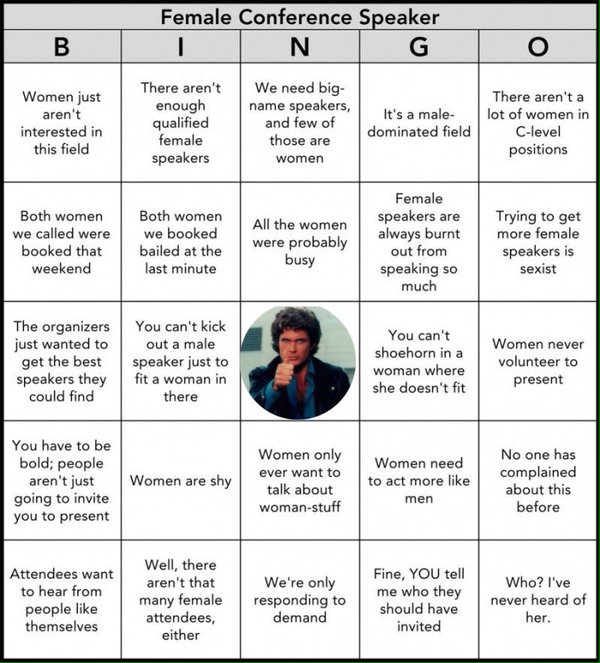Article initially published in the Feminist Tribune (@TFeminista_)
A few days ago, a new discussion emerged on Twitter about why at a table to talk about media independence organized by the Madrid Press Association (Asociación de la Prensa de Madrid).@aprensamadrid), in which 7 people participated, there was no woman. You can imagine the argument made because you will have heard it on more than one occasion:
Magda, women journalists have also been invited but have not been able to attend.
— APM (@aprensamadrid) May 27, 2016
The answers to this type of warnings are always the same, to the point that someone has bothered to create a wonderful table with the most used ones so as not to repeat us like garlic: there was no woman expert on that subject, they did not want to, one said at the last minute that she could not come ...

There is a tumblr titled “All male panel” (all the male panel) in which you can share all those events in which not a single woman is invited. It is an ironic way to make visible the invisibility of half the population, since all the excuses that are given as solid arguments can be refuted. And the main problem is that the responsibility is not assumed that the lack of women in these spaces of analysis and debate continues to occur, because that would imply that (the same) we are male chauvinists and that not everyone is willing to assume it.
Why it's so complicated to have women
Beyond the prototypical answers we saw above, let's do a little introspection. Let's not even stay in the present moment and think from a historical perspective. How many women do we know in fields such as science, programming, law, architecture...? If we were asked for references right now, how many names could we give for them to be part of a panel of experts? I do not know for you but for me this is a great effort even in my field of work.
Except for the last few years (in which I have opened my networks), I had always been much more openly related to men than to women. And I kept them in mind. And many times I have made them referents of certain areas of knowledge without inquiring much more. So it happened that, when someone asked me for some contact to speak in a media, I almost always offered the names of these men. Yes, my machismo has contributed to this being so.
Initiatives to make us visible
During the month of March and April, Wikimedia Argentina (@wikimedia_ar) organised the initiative ‘The woman you never knew’. A contest in which it was requested that biographies of women who did not exist be created or translated into Spanish to make them visible in the free encyclopedia. And thus fulfill a double mission: on the one hand, creating more women-related content on Wikipedia; and, on the other hand, (and for me almost more important) so that we value the lives of these women who have helped us get here and many times we do not even know that they existed.
In my case, I was surprised to find more biographies of Spanish suffragettes on the English Wikipedia than in our own language. I was surprised and angry, because today we are fighting for rights that were already being claimed in the 19th century. And the women of that time, much harder than ours and unable to communicate as we can now, organized to achieve equality and education.
Once the mea culpa is intoned and being aware of what I have left to know about you, let's stop making excuses and make the effort: Let's look for women when we go to organize a discussion table. They exist. Really. Let's not keep the first names that come up to us (which are usually those of men) and ask. We have social networks and contacts. Let's go one step further and the next time it will be easier. Let's challenge ourselves to make ourselves visible to each other as well.


